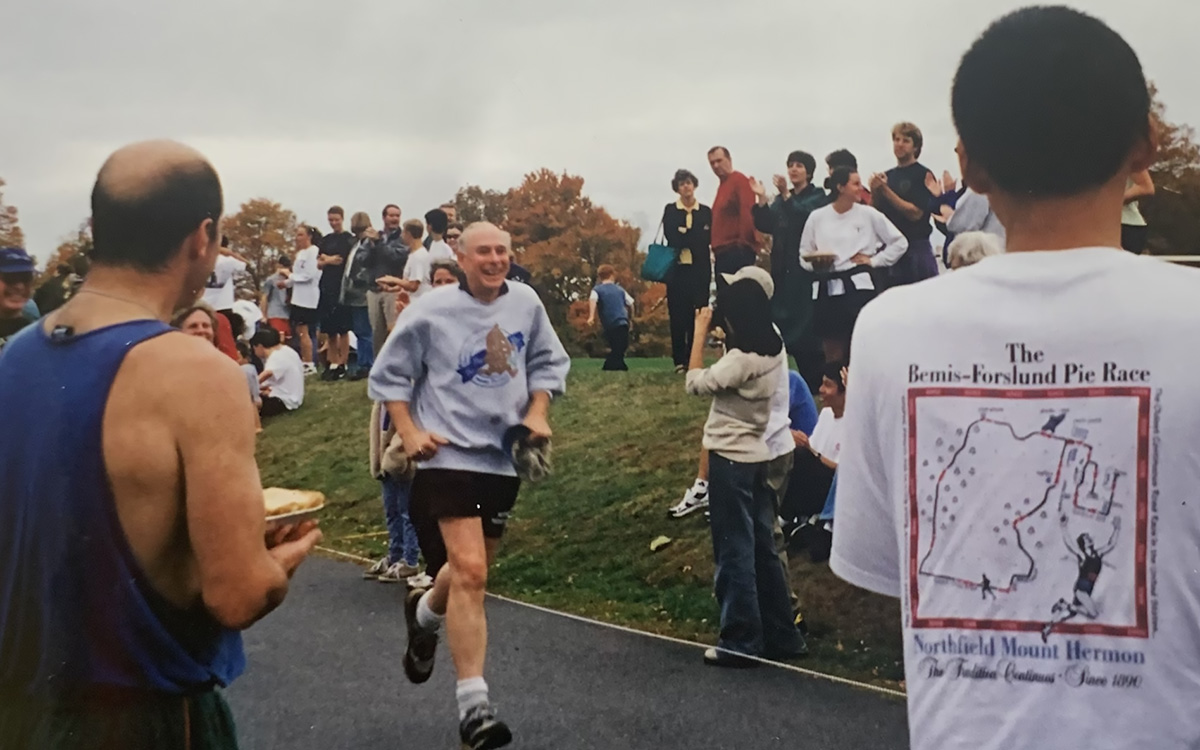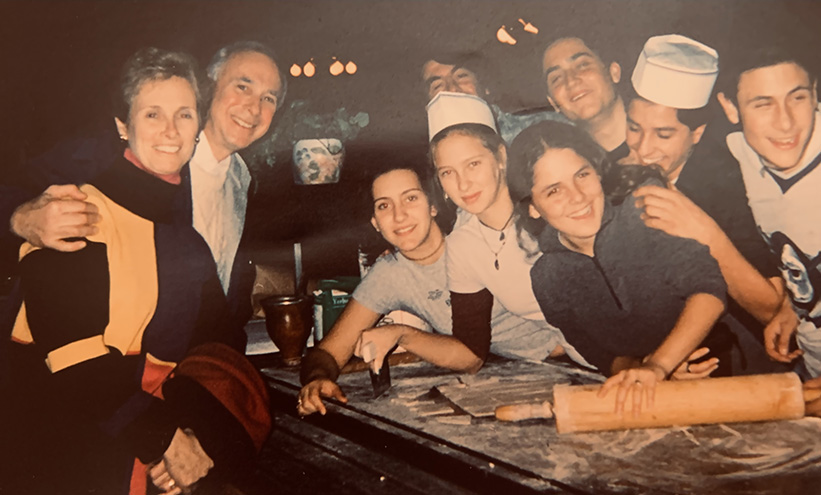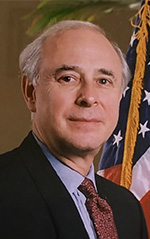Life After the Foreign Service: From U.S. Diplomat to Diplomatic Educator
This retired FSO made the move from diplomat to international educator. Here’s how it happened.
BY RICHARD W. MUELLER

Author Richard Mueller participating in a “pie race challenge” in 2002 while head of school at Northfield Mount Hermon School in Massachusetts. He won a pie!
Courtesy of Richard Mueller
The following exchange took place in November 1997 in Hong Kong:
Bill: I’d like to ask you a serious question. Please don’t say no right away!
Richard: Sure.
Bill: You know that our head of school of Northfield Mount Hermon School [NMH] is retiring next summer after 10 years. You should put your hat in the ring to replace her. You have experience and skills that could make you the right leader for the next chapter of our school’s history.
Richard: Bill, I’m a diplomat, not an educator!
Bill: Richard, I assure you that diplomacy will go a long way in the world of education.
What factors led the trustees to choose me as a nontraditional candidate?
Bill Rhodes was chair of the Board of Trustees of NMH and senior vice chair of Citigroup. I was a 32-year career Foreign Service officer, Senior Foreign Service, FEMC, who had just finished up his tour as American consul general in Hong Kong and was awaiting an ambassadorial assignment. In the interim, I served as director of the Asia Society Hong Kong Center.
How did we ever get to this conversation? In a word: serendipity. Shortly after becoming consul general, I had lunch with Bill to discuss China, Hong Kong, and the looming 1997 reversion of Hong Kong to China.
Toward the end of the meal, Bill said he needed to catch a flight to New York, where he would chair a meeting of the trustees of a New England boarding school. I asked which school. Bill replied, “Northfield Mount Hermon School, do you know it?” I laughed and said in fact I was a graduate of the school. Bill was visibly surprised as he took in the news that we were both alumni.
Bill and I stayed in touch. It never occurred to me that my next “assignment” might be as head of school.
After our meeting in 1997, Bill invited me to meet with the school’s search committee in New York. Claire and I decided it was worth the trip to see if there was enough common interest on both sides. I was prepared for a committee decision that I wasn’t who they were looking for and for me to decide I’d rather wait for my next Foreign Service assignment.
Like a chief of mission, you are on duty 24 hours a day, prepared for the inevitable crises and emergencies.
It turned out otherwise. They were intrigued with my unusual Foreign Service and international background. I had the glimmerings of a feeling that NMH could be a positive move for us.
We traded a wide variety of ideas about international education and experience, leadership styles, and relationship-building with a community of students, faculty, trustees, alumni, and parents. I knew we might be in the ballpark of a match when one of the senior trustees started a question by saying, “If we were so fortunate to have you as our head of school …”
The committee offered me a spot as one of three strong finalists. I would next have to visit and survive the gauntlet of 25 interviews in two and a half days.
Claire and I arrived at the school some weeks later for an energizing but exhausting round of interviews. The questioning ran the gamut of my experience as a student, my international experience over the years, my involvement as a trustee and board chair at Hong Kong International School, how I might deal with controversy, and what kind of collaborator I would be.
We explored what relationship I would establish with the faculty—namely, a partnership and not an autocratic, top-down approach. I particularly loved the gatherings with students who weren’t shy about asking tough questions or candidly sharing their views.
In the end, what factors led the trustees to choose me as a nontraditional candidate? At the top of the list, they felt I could be a credible leader of a complex 1,155-student boarding school on two campuses separated by the Connecticut River.

Richard and Claire Mueller with students at Hong Kong International School in 2007.
Courtesy of Richard Mueller
I showed promise of helping the school chart new strategic directions while also overseeing management of the myriad day-to-day issues of hiring faculty, setting the right academic tone, resolving disputes, fundraising, and collaborating with the trustees. Like a chief of mission, you are on duty 24 hours a day, prepared for the inevitable crises and emergencies.
I had broad experience in the Foreign Service with all such issues and was an enthusiastic proponent of strengthening the school’s deep roots, going back to our founder, D.L. Moody, in international education. They said they were convinced I was still a lifelong learner who could adapt to a school environment.
How did it all work out? In a nutshell, the experience was wonderful. Our seven years living on campus, mingling every day with students, engaging in vigorous academic debate, attending concerts and sports events, building bridges among differing community groups, and bringing our knowledge of the world directly to everything we did was exceptional and rewarding.
Claire was an invaluable co-pilot in so many ways, including serving as host of our Ford Cottage “bed-and-breakfast” and enthusiastically involving herself in myriad school activities. We never forgot our motto: It’s all about our students! Decisions were driven by what was good for their education.
We set a new strategic direction for the school to make it a smaller community on one campus (that was a profound and extended leadership effort), and we broadened and reinforced an already strong educational program. Claire’s and my experience served well as I subsequently became head of school of Hong Kong International School and then Shanghai American School.
I learned that Foreign Service colleagues with deep experience in leading embassies, consulates, and Department of State bureaus; using diplomatic skills to conduct successful negotiations; and bringing groups together could be strong candidates to be head of school at an international or independent school.
It is a different role than becoming a university teacher or diplomat in residence. More and more trustees these days are willing to consider candidates with demonstrated skills in leading large organizations, bringing creativity, new ideas, and synergy in partnership with faculties and trustees.
The best route to learn more is to contact several educational search firms and start a dialogue. There will be some skepticism but also curiosity and interest.




